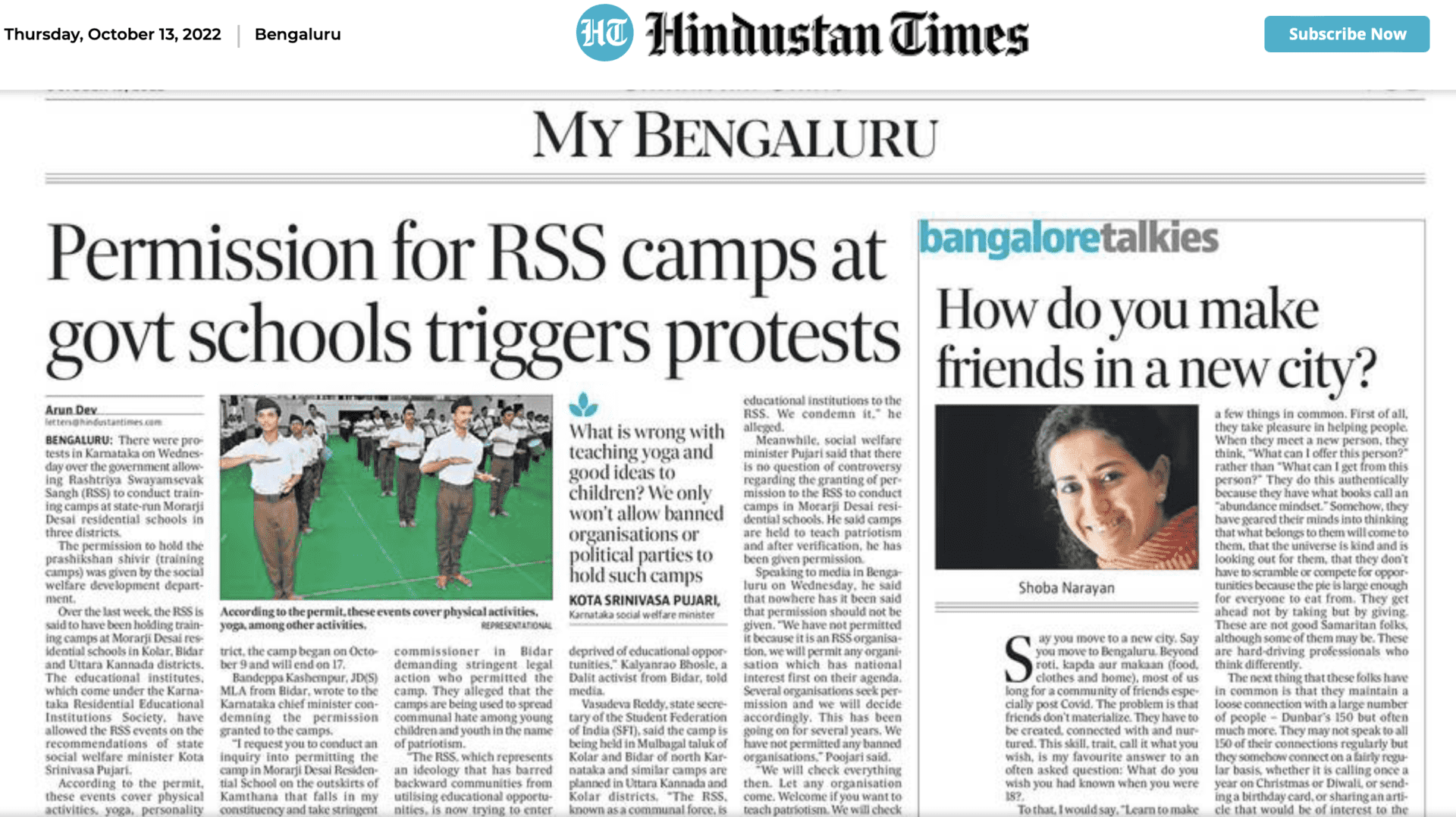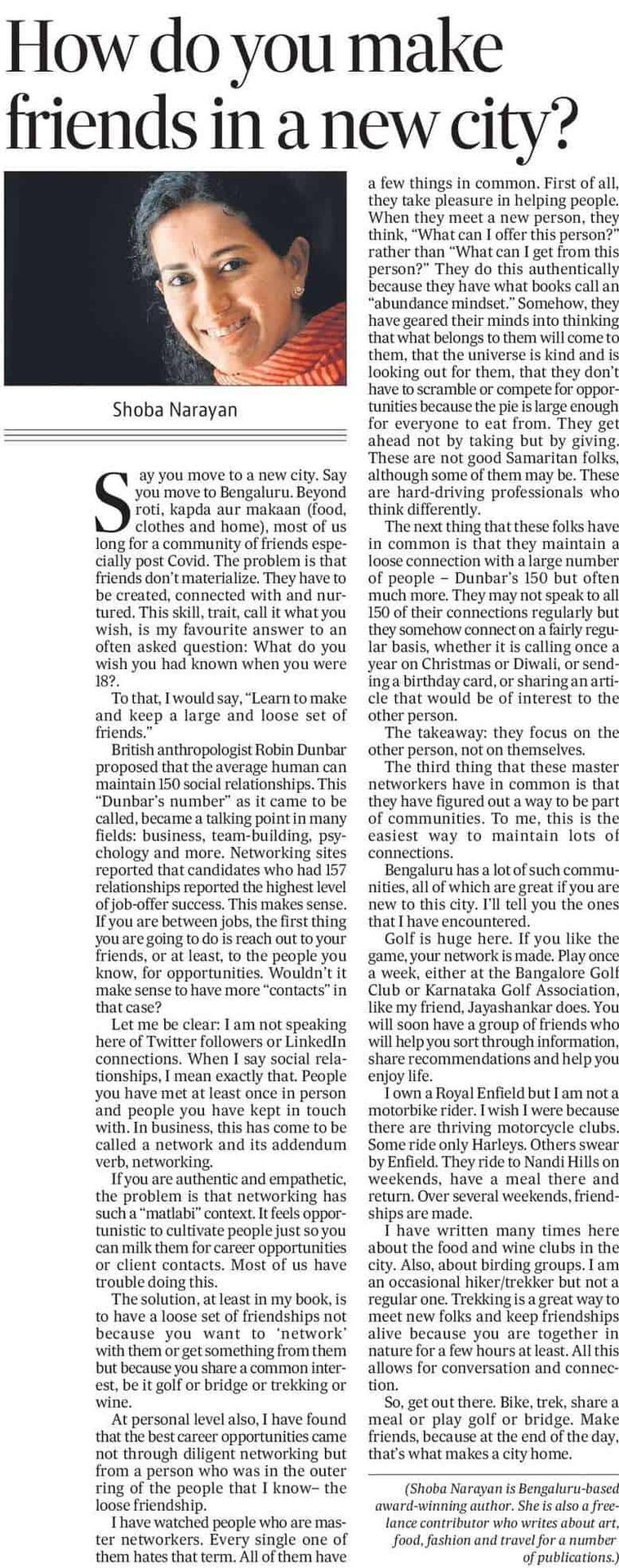Say you move to a new city. Say you move to Bangalore. Beyond roti, kapda aur makhan (food, clothes and home), most of us long for a community of friends especially post Covid. The problem is that friends don’t materialize. They have to be created, connected with and nurtured.
This skill, trait, call it what you wish, is my favourite answer to an oft-asked question: what do you wish you had known when you were 18.
To that, I would say, “Learn to make and keep a large and loose set of friends.”
British anthropologist Robin Dunbar proposed that the average human can maintain 150 social relationships. This “Dunbar’s number” as it came to be called, became a talking point in many fields: business, team-building, psychology and more. Networking sites reported that candidates who had 157 relationships reported the highest level of job-offer success. This makes sense. If you are between jobs, the first thing you are going to do is reach out to your friends, or at least, to the people you know, for opportunities. Wouldn’t it make sense to have more “contacts” in that case?
Let me be clear: I am not speaking here of Twitter followers or LinkedIn connections. When I say social relationships, I mean exactly that. People you have met at least once in person and people you have kept in touch with. In business, this has come to be called a network and its addendum verb, networking.
If you are authentic and empathetic, the problem is that networking has such a “matlabi” context. It feels opportunistic to cultivate people just so you can milk them for career opportunities or client contacts. Most of us have trouble doing this.
The solution, at least in my book, is to have a loose set of friendships not because you want to ‘network’ with them or get something from them but because you share a common interest be it golf or bridge or trekking or wine.
In my own life, I have found that the best career opportunities came not through diligent networking but from a person who was in the outer ring of the people that I know– the loose friendship.
I have watched people who are master networkers. Every single one of them hates that term. All of them have a few things in common. First of all, they take pleasure in helping people. When they meet a new person, they think, “What can I offer this person?” rather than “What can I get from this person?” They do this authentically because they have what books call an “abundance mindset.” Somehow they have geared their minds into thinking that what belongs to them will come to them, that the universe is kind and is looking out for them, that they don’t have to scramble or compete for opportunities because the pie is large enough for everyone to eat from. They get ahead not by taking but by giving. These are not good Samaritan folks, although some of them may be. These are hard-driving professionals who think differently.
The next thing that these folks have in common is that they are maintain a loose connection with a large number of people– Dunbar’s 150 but often much more. They may not speak to all 150 of their connections regularly but they somehow connect on a fairly regular basis, whether it is calling once a year on Christmas or Diwali, or sending a birthday card, or sharing an article that would be of interest to the other person. The takeaway: they focus on the other person, not on themselves.
The third thing that these master networkers have in common is that they have figured out a way to be part of communities. To me, this is the easiest way to maintain lots of connections.
Bangalore has a lot of such communities, all of which are great if you are new to this city. I’ll tell you the ones that I have encountered.
Golf is huge here. If you like the game, your network is made. Play once a week, either at the Bangalore Golf Club or Karnataka Golf Association, like my friend, Jayashankar does. You will soon have a group of friends who will help you sort through information, share recommendations and help you enjoy life.
I own a Royal Enfield but I am not a motorbike rider. I wish I were because there are thriving motorcycle clubs. Some ride only Harleys. Others swear by Enfield. They ride to Nandi Hills on weekends, have a meal there and return. Over several weekends, friendships are made.
I have written many times here about the food and wine clubs in the city. Also about birding groups. I am an occasional hiker/trekker but I am not a regular one. Trekking is a great way to meet new folks and keep friendships alive because you are together in nature for a few hours at least. All this allows for conversation and connection.






Leave A Comment